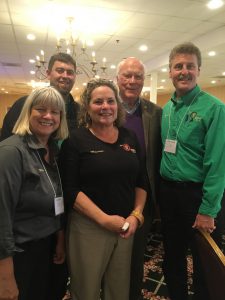Vermont Farm to School Conference Gathers 250 Local and National Leaders to Listen, Learn, and Develop Plans to Grow Farm to School Throughout Vermont

Over 250 local and national farm to school leaders gathered together this week at the 2016 Vermont Farm to School Conference to learn about the positive impacts of Farm to School programming, sample local cuisine, and help shape the future of farm to school in Vermont. Held over the course of two days at Lake Morey Resort in Fairlee, Vermont, the conference featured talks by US Senator Patrick Leahy, USDA Farm to School and Community Food Systems Director Deborah Kane, and Executive Director of Child Nutrition of Detroit Public Schools Betti Wiggins.
Conference attendees had opportunities to attend over 25 workshops focused on a variety of topics including farm to school curriculum design and funding strategies, sharing stories of impact, school garden program planning, and engaging teens through innovative food systems programs. A number of state government leaders and representatives were also in attendance, including Vermont Deputy Secretary of Agriculture Jolinda LaClair, Commissioner of Health Harry Chen, MD, Secretary of Education Rebecca Holcombe, and Windsor County Senator Dick McCormack.
“Vermont has long been a leader of farm to school efforts, and this conference is a clear indicator of what has seeded that leadership,” said USDA Farm to School Director Deborah Kane during her keynote speech yesterday. “I am so inspired by Vermont’s vast farm to school network and its strong, meaningful, and effective partnerships. Working together helps make farm to school work!”
The first state in the nation to implement a Farm to School Grant Program, Vermont has long been a national leader in the Farm to School movement. Since 2007 the Vermont Farm to School Grant Program, administered by the Vermont Agency of Agriculture, Food & Markets (VAAFM), has invested over $1.5 million in Farm to School Programs in over 30% of Vermont’s schools, impacting over 30,000 students.
The Vermont Agency of Agriculture, Food, and Markets recently announced more than $130,000 in funding available to Vermont schools in 2017. Grants are available for planning and development of new Farm to School (FTS) Programs, expanding existing FTS programs, or (new for 2017) transitioning to a universal meals program, which enables schools to offer all students fresh, healthy meals at no charge.
“I am extremely proud of the innovation and leadership provided by Vermont’s Farm to School Network over the last 10 years, and I’m pleased to see so many people here today working together to strengthen and grow the farm to school movement throughout our state,” said Vermont Ag Deputy Secretary Jolinda LaClair. “Our Farm to School programs are essential to building a culture of ‘Ag Literacy’ in our schools and communities and to preparing our students to make a lifetime of healthy choices.”
Hosted by the Agency of Ag and Vermont FEED, in partnership with the Vermont Farm to School Network, the 2016 Farm to School Conference offered workshops and opportunities for both beginners and experts dedicated to food, farm, and nutrition education. The goals of the conference included:
- Strengthening the connections between the Classroom, Cafeteria, and Community and share best practices from across the state
- Strengthening the Vermont Farm to School Network and connect people so they envision themselves as part of the FTS Movement
- Widening the audience aligned with Vermont’s Farm to School goals and strategies
Betty Wiggins, the Executive Director of Child Nutrition of Detroit Public Schools, spoke at the conference dinner on Wednesday night, which featured bean and vegetable cassoulet made with locally grown beans from Vermont Bean Crafters. Responsible for school meals in 137 schools in Detroit, Betty credits the Vermont Farm to School model for much of the success of her farm to school programs.
“I need to thank Vermont and all of you for providing me with the inspiration to start farm to school programs in my own school system in Detroit,” said Wiggins. “Almost a decade ago, I visited Vermont to learn about farm to school, and I stole your model. At this point in my talk, I just wanted to remind you all that imitation is the highest form of flattery.”
“Our goal at the Vermont Department of Health is to help ensure the ‘healthy choice’ is also the easy choice and the attractive choice for kids,” said Health Commissioner Harry Chen, MD. “Farm to School does just that by making local, healthy foods available to our children in a way that is appealing to them.”
The conference attracted a wide range of FTS members and leaders, including farmers, food processors & distributors, child nutrition professionals, teachers, school administrators, government officials, policy makers, advocates, and non-profit partners. In welcoming remarks, VAAFM Food Systems Chief Abbey Willard challenged all conference attendees to “learn something new, share something inspirational, and commit to replicating something successful in your community.”
Conference attendees heeded this opportunity and spent two inspirational days sharing stories and communicating the educational, nutritional, and economic impacts of Farm to School in their communities.
For more information about Vermont Farm to School visit http://agriculture.vermont.gov/producer_partner_resources/market_access_development/farm_school or contact Ali Zipparo at Alexandra.Zipparo@vermont.gov or call (802) 505-1822.
###
About the Vermont Agency of Agriculture, Food, and Markets: VAAFM facilitates, supports and encourages the growth and viability of agriculture in Vermont while protecting the working landscape, human health, animal health, plant health, consumers and the environment. www.Agriculture.Vermont.Gov
If you would like to be removed from our email distribution list, please reply with “unsubscribe” in the subject line.